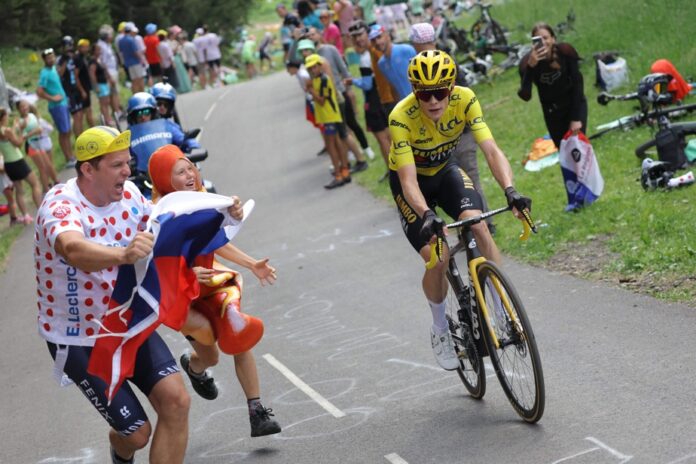The day after the amazement caused by his supersonic time trial, Jonas Vingegaard killed the last bits of suspense that remained as to the outcome of the Tour de France on Wednesday.
Moreover, taking advantage of an unprecedented craving for his main rival Tadej Pogačar, the Dane from Jumbo-Visma can already think of where he will install the frame of his second yellow jersey in his residence in Glyngore, in the north-west of Denmark.
Vingegaard stunned the competition by finishing fourth in the queen stage, where even a traffic jam in the Col de la Loze, caused by an overflow of spectators, did not stop his momentum towards the altiport of Courchevel, where the Austrian Felix Gall (AG2R) won this 17th stage.
The order of the top four in the standings has not changed, but the gap between the leader and his closest pursuer is now measured in minutes, compared to just 10 seconds on Tuesday morning.
Vingegaard crossed the line 5 min 45 s before Pogačar (22nd), inflating his lead to 7 min 35 s, unheard of at this stage of the race since 1981.
“It’s hard to describe,” reacted the man in yellow, smiling more than ever at the microphone of Sébastien Piquet, responsible for post-race interviews. “To have priority over seven minutes is just really amazing. But of course, the Tour de France is not over yet. »
This end, he said it without laughing, even if his sporting director, approaching the line, shouted to him in the headset that he had “won the Tour”.
No one doubts that, especially not Tadej Pogačar, who laid down his arms in the heart of the stage with this relentless observation broadcast on the air: “I left. I am dead. »
White jersey wide open, the Slovenian from UAE had just cracked just over 8 km from the top of Loze, while a dozen runners were still clinging to the yellow jersey group led by the Ineos of Carlos Rodríguez, 15th at the finish and still fourth overall.
Unheard of for the double winner of 2020 and 2021. After having dropped a blasphemy on the microphone, Pogačar could not explain what can be described as a collapse for a runner of his caliber.
“I don’t know [what happened]. I tried to eat as much as possible, but it felt like nothing was getting to my legs. It all stayed in my stomach and I felt really empty after three and a half hours of running at the bottom of the climb. If I hadn’t had such support, I would have already started thinking about losing the podium today. »
Survived by his teammate Marc Soler, ejected from the breakaway, Pogačar nevertheless “fought to the finish” to preserve his second place. His lieutenant Adam Yates, who followed Vingegaard for a while, consolidated his third position (10 min 45 s) with support from Poland’s Rafał Majka, also a member of the breakaway.
Pogačar refused the excuse of his fall at kilometer 15, a silly collision with an AG2R cyclist on a climb, to explain his disappointment later.
“It didn’t hurt that bad, a little for sure, and it may have affected my body.” But I couldn’t go today. I was no good. »
Pogačar confirmed that he had just had one of his “worst days on a bike”, much more difficult than that of the Granon last year, where he dropped just under three minutes at Vingegaard.
What can he expect between now and the arrival in Paris on Sunday? Win a stage victory on Saturday at the top of the Markstein and keep his podium with Yates. A meager tribute for a champion of this stature.
It is a moment dreaded by any cyclist, when he suddenly loses all his strength, his energy, his ability to “move forward”, to maintain the rhythm of the race. Its origin is sometimes mysterious, sometimes caused by poor diet (hypoglycaemia), a rare phenomenon nowadays with the advanced development of knowledge in sports nutrition.





